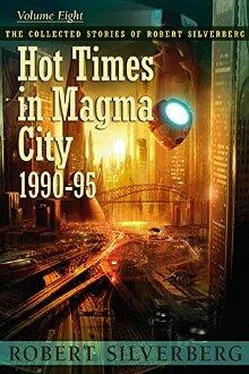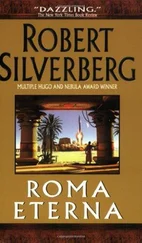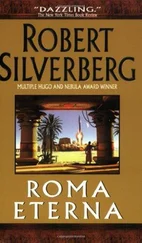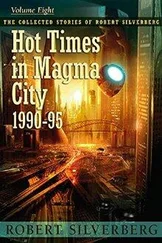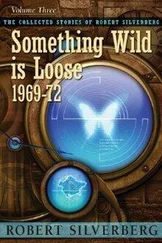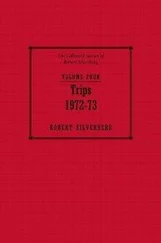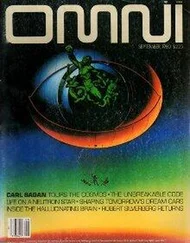Robert Silverberg - We Are for the Dark
Здесь есть возможность читать онлайн «Robert Silverberg - We Are for the Dark» весь текст электронной книги совершенно бесплатно (целиком полную версию без сокращений). В некоторых случаях можно слушать аудио, скачать через торрент в формате fb2 и присутствует краткое содержание. Год выпуска: 2014, ISBN: 2014, Издательство: Subterranean Press, Жанр: Фантастика и фэнтези, на английском языке. Описание произведения, (предисловие) а так же отзывы посетителей доступны на портале библиотеки ЛибКат.
- Название:We Are for the Dark
- Автор:
- Издательство:Subterranean Press
- Жанр:
- Год:2014
- ISBN:978-1-59606-693-9
- Рейтинг книги:3 / 5. Голосов: 1
-
Избранное:Добавить в избранное
- Отзывы:
-
Ваша оценка:
- 60
- 1
- 2
- 3
- 4
- 5
We Are for the Dark: краткое содержание, описание и аннотация
Предлагаем к чтению аннотацию, описание, краткое содержание или предисловие (зависит от того, что написал сам автор книги «We Are for the Dark»). Если вы не нашли необходимую информацию о книге — напишите в комментариях, мы постараемся отыскать её.
We Are for the Dark — читать онлайн бесплатно полную книгу (весь текст) целиком
Ниже представлен текст книги, разбитый по страницам. Система сохранения места последней прочитанной страницы, позволяет с удобством читать онлайн бесплатно книгу «We Are for the Dark», без необходимости каждый раз заново искать на чём Вы остановились. Поставьте закладку, и сможете в любой момент перейти на страницу, на которой закончили чтение.
Интервал:
Закладка:
It appears that they have not drifted as far from Darklaw here as the Zimans have.
Certainly the Order is respected. There are chapels everywhere and the people use them. Whenever I enter one there is a little stir of excitement, for it is generally known that I was Lord Magistrate of the Senders during my time on Earth, and that makes me a celebrity, or a curiosity, or both. Many of the Entradans are Earthborn themselves—emigration to this world was still going on as recently as eight or ten years ago—and the sight of my medallion inspires respect and even awe in them. I do not wear my robe of office, not in this heat. Probably I will never wear it again, no matter what climate I find myself in when I leave here. Someone else is Lord Magistrate of the House of Senders now, after all. But the medallion alone is enough to win me a distinction here that I surely never had on Zima.
I think, though, that they pick and choose among the tenets of Darklaw to their own satisfaction on Entrada, obeying those which suit them and casting aside anything that seems too constricting. I am not sure of this, but it seems likely. To discuss such matters with anyone I have come to know here is, of course, impossible. The people I have managed to get to know so far, at the hospice, at the chapel house in town, at the tavern where I have begun to take my meals, are pleasant and sociable. But they become uneasy, even evasive, whenever I speak of any aspect of Earth’s migration into space. Let me mention the Order, or the Master, or anything at all concerning the Mission, and they begin to moisten their lips and look uncomfortable. Clearly things are happening out here, things never envisioned by the founders of the Order, and they are unwilling to talk about them with anyone who himself wears the high medallion.
It is a measure of the changes that have come over me since I began this journey that I am neither surprised nor dismayed by this.
Why should we have believed that we could prescribe a single code of law that would meet the needs of hundreds of widely varying worlds? Of course they would modify our teachings to fit their own evolving cultures, and some would probably depart entirely from that which we had created for them. It was only to be expected. Many things have become clear to me on this journey that I did not see before, that, indeed, I did not so much as pause to consider. But much else remains mysterious.
I am at the busy waterfront esplanade, leaning over the rail, staring out toward Volcano Isle, a dim gray peak far out to sea. It is mid-morning, before the full heat of noon has descended. I have been here long enough so that I think of this as the cool time of the day.
“Your grace?” a voice calls. “Lord Magistrate?”
No one calls me those things here.
I glance down to my left. A dark-haired man in worn seaman’s clothes and a braided captain’s hat is looking up at me out of a rowboat just below the sea-wall. He is smiling and waving. I have no idea who he is, but he plainly wants to talk with me, and anything that helps me break the barrier that stands between me and real knowledge of this place is to be encouraged.
He points to the far end of the harbor, where there is a ramp leading from the little beach to the esplanade, and tells me in pantomime that he means to tie up his boat and go ashore. I wait for him at the head of the ramp, and after a few moments he comes trudging up to greet me. He is perhaps fifty years old, trim and sun-bronzed, with a lean weatherbeaten face.
“You don’t remember me,” he says.
“I’m afraid not.”
“You personally interviewed me and approved my application to emigrate, eighteen years ago. Sandys. Lloyd Sandys.” He smiles hopefully, as though his name alone will open the floodgates of my memory.
When I was Lord Magistrate I reviewed five hundred emigrant dossiers a week, and interviewed ten or fifteen applicants a day myself, and forgot each one the moment I approved or rejected them. But for this man the interview with the Lord Magistrate of the Senders was the most significant moment of his life.
“Sorry,” I say. “So many names, so many faces—”
“I would have recognized you even if I hadn’t already heard you were here. After all these years, you’ve hardly changed at all, your grace.” He grins. “So now you’ve come to settle on Entrada yourself?”
“Only a short visit.”
“Ah.” He is visibly disappointed. “You ought to think of staying. It’s a wonderful place, if you don’t mind a little heat. I haven’t regretted coming here for a minute.”
He takes me to a seaside tavern where he is obviously well known, and orders lunch for both of us: skewers of small corkscrew-shaped creatures that look and taste a little like squid, and a flask of a strange but likable emerald-colored wine with a heavy, musky, spicy flavor. He tells me that he has four sturdy sons and four strapping daughters, and that he and his wife run a harbor ferry, short hops to the surrounding islands of this archipelago, which is Entrada’s main population center. There still are traces of Melbourne in his accent. He seems very happy. “You’ll let me take you on a tour, won’t you?” he asks. “We’ve got some very beautiful islands out there, and you can’t get to see them by Velde jumps.”
I protest that I don’t want to take him away from his work, but he shrugs that off. Work can always wait, he says. There’s no hurry, on a world where anyone can dip his net in the sea and come up with a good meal. We have another flask of wine. He seems open, genial, trustworthy. Over cheese and fruit he asks me why I’ve come here.
I hesitate.
“A fact-finding mission,” I say.
“Ah. Is that really so? Can I be of any help, d’ye think?”
It is several more winy lunches, and a little boat-trip to some nearby islands fragrant with masses of intoxicating purple blooms, before I am willing to begin taking Sandys into my confidence. I tell him that the Order has sent me into the Dark to study and report on the ways of life that are evolving on the new worlds. He seems untroubled by that, though Ilya Alexandrovitch might have had me shot for such an admission.
Later, I tell him about the apparent deviations from the planned scope of the Mission that are the immediate reason for my journey.
“You mean, going out beyond the hundred-light-year zone?”
“Yes.”
“That’s pretty amazing, that anyone would go there.”
“We have indications that it’s happening.”
“Really,” he says.
“And on Zima,” I continue, “I picked up a story that somebody here on Entrada has been preaching ventures into the far Dark. You don’t know anything about that, do you?”
His only overt reaction is a light frown, quickly erased. Perhaps he has nothing to tell me. Or else we have reached the point, perhaps, beyond which he is unwilling to speak.
But some hours later he revives the topic himself. We are on our way back to harbor, sunburned and a little tipsy from an outing to one of the prettiest of the local islands, when he suddenly says, “I remember hearing something about that preacher you mentioned before.”
I wait, not saying anything.
“My wife told me about him. There was somebody going around talking about far voyages, she said.” New color comes to his face, a deep red beneath the bronze. “I must have forgotten about it when we were talking before.” In fact he must know that I think him disingenuous for withholding this from me all afternoon. But I make no attempt to call him on that. We are still testing each other.
I ask him if he can get more information for me, and he promises to discuss it with his wife. Then he is absent for a week, making a circuit of the outer rim of the archipelago to deliver freight. When he returns, finally, he brings with him an unusual golden brandy from one of the remote islands as a gift for me, but my cautious attempt to revive our earlier conversation runs into a familiar sort of Entradan evasiveness. It is almost as though he doesn’t know what I’m referring to.
Читать дальшеИнтервал:
Закладка:
Похожие книги на «We Are for the Dark»
Представляем Вашему вниманию похожие книги на «We Are for the Dark» списком для выбора. Мы отобрали схожую по названию и смыслу литературу в надежде предоставить читателям больше вариантов отыскать новые, интересные, ещё непрочитанные произведения.
Обсуждение, отзывы о книге «We Are for the Dark» и просто собственные мнения читателей. Оставьте ваши комментарии, напишите, что Вы думаете о произведении, его смысле или главных героях. Укажите что конкретно понравилось, а что нет, и почему Вы так считаете.
